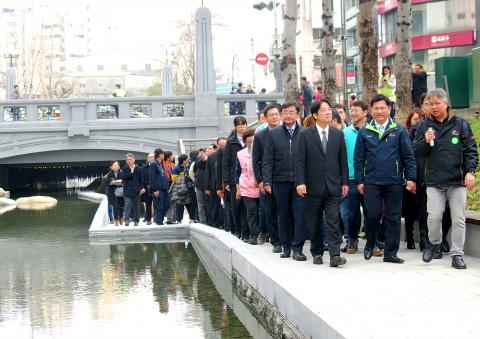Premier William Lai (賴清德) on Friday said he would fully support relocating the Executive Yuan and the Legislative Yuan to Taichung if the legislature passes a motion to do so.
Lai made the remarks in Taichung at a forum on how to streamline efforts between the central and local governments to push the Cabinet’s Forward-looking Infrastructure Development Program and the Long-term Care Services Program 2.0 forward, in response to Deputy Legislative Speaker Tsai Chi-chang’s (蔡其昌) suggestion to move the two agencies to the central municipality.
“If lawmakers resolve to move the Legislative Yuan to Taichung, there will be no reason for the Executive Yuan to object,” said Taichung Mayor Lin Chia-lung (林佳龍), who also attended the forum.

Photo: Chang Ching-ya, Taipei Times
Because Taipei is the nation’s political and economic hub, a large earthquake would have a detrimental effect on national development, Tsai said, adding that moving the administrative and legislative branches to Taichung could help government efforts to balance regional development.
If the legislature is moved to Taichung’s Chenggong Ling (成功嶺) military training camp, there would be sufficient space for protests and demonstrations, and business near the Legislative Yuan would no longer suffer due to traffic controls during protests, Tsai said.
He also pitched the idea of creating a “democracy square” at Chenggong Ling, while touting Taichung as “a vast city with convenient transportation links.”
Lin agreed, saying that lawmakers and officials could easily reach the municipality by taking the High-Speed Rail, and that national land reform is the “last mile to realizing democracy.”
“If the Legislative Yuan passes a resolution, the Executive Yuan would give its full support” to relocating, Lai said.
Lin has long advocated relocating the Legislative Yuan.
In a 2012 letter to the Chinese-language Liberty Times (sister newspaper of the Taipei Times), Lin said that the relocation of the legislature to Taichung could address the problem of uneven development between the northern, central, southern and eastern areas, which has increased the urban-rural gap.
“By moving the legislature, it would be possible to come up with ways to develop national land that benefit everyone and to implement government renewal,” he said.

The Ministry of Foreign Affairs (MOFA) yesterday said it is closely monitoring developments in Venezuela, and would continue to cooperate with democratic allies and work together for regional and global security, stability, and prosperity. The remarks came after the US on Saturday launched a series of airstrikes in Venezuela and kidnapped Venezuelan President Nicolas Maduro, who was later flown to New York along with his wife. The pair face US charges related to drug trafficking and alleged cooperation with gangs designated as terrorist organizations. Maduro has denied the allegations. The ministry said that it is closely monitoring the political and economic situation

Conflict with Taiwan could leave China with “massive economic disruption, catastrophic military losses, significant social unrest, and devastating sanctions,” a US think tank said in a report released on Monday. The German Marshall Fund released a report titled If China Attacks Taiwan: The Consequences for China of “Minor Conflict” and “Major War” Scenarios. The report details the “massive” economic, military, social and international costs to China in the event of a minor conflict or major war with Taiwan, estimating that the Chinese People’s Liberation Army (PLA) could sustain losses of more than half of its active-duty ground forces, including 100,000 troops. Understanding Chinese

UNRELENTING: China attempted cyberattacks on Taiwan’s critical infrastructure 2.63 million times per day last year, up from 1.23 million in 2023, the NSB said China’s cyberarmy has long engaged in cyberattacks against Taiwan’s critical infrastructure, employing diverse and evolving tactics, the National Security Bureau (NSB) said yesterday, adding that cyberattacks on critical energy infrastructure last year increased 10-fold compared with the previous year. The NSB yesterday released a report titled Analysis on China’s Cyber Threats to Taiwan’s Critical Infrastructure in 2025, outlining the number of cyberattacks, major tactics and hacker groups. Taiwan’s national intelligence community identified a large number of cybersecurity incidents last year, the bureau said in a statement. China’s cyberarmy last year launched an average of 2.63 million intrusion attempts per day targeting Taiwan’s critical

‘SLICING METHOD’: In the event of a blockade, the China Coast Guard would intercept Taiwanese ships while its navy would seek to deter foreign intervention China’s military drills around Taiwan this week signaled potential strategies to cut the nation off from energy supplies and foreign military assistance, a US think tank report said. The Chinese People’s Liberation Army (PLA) conducted what it called “Justice Mission 2025” exercises from Monday to Tuesday in five maritime zones and airspace around Taiwan, calling them a warning to “Taiwanese independence” forces. In a report released on Wednesday, the Institute for the Study of War said the exercises effectively simulated blocking shipping routes to major port cities, including Kaohsiung, Keelung and Hualien. Taiwan would be highly vulnerable under such a blockade, because it